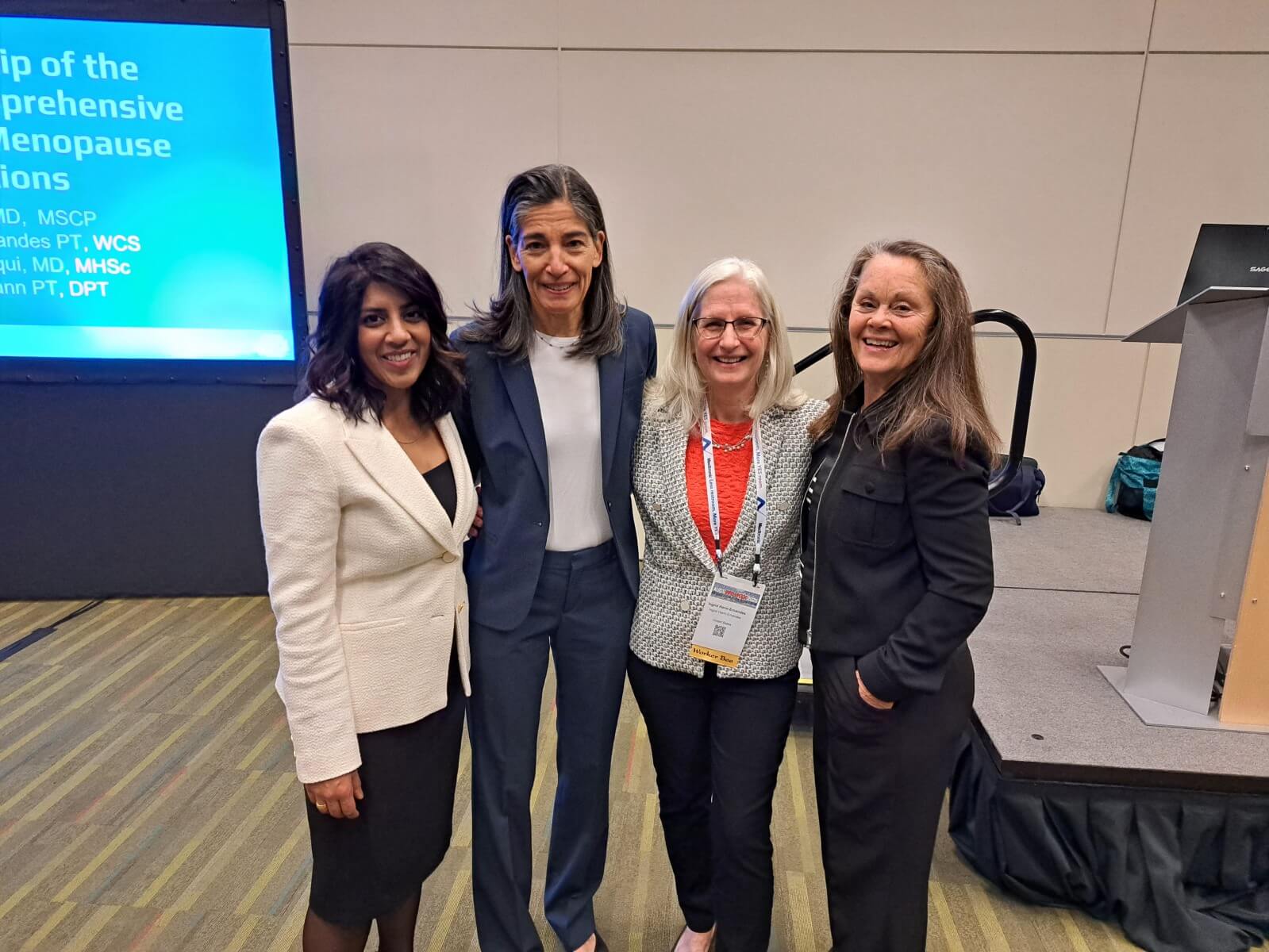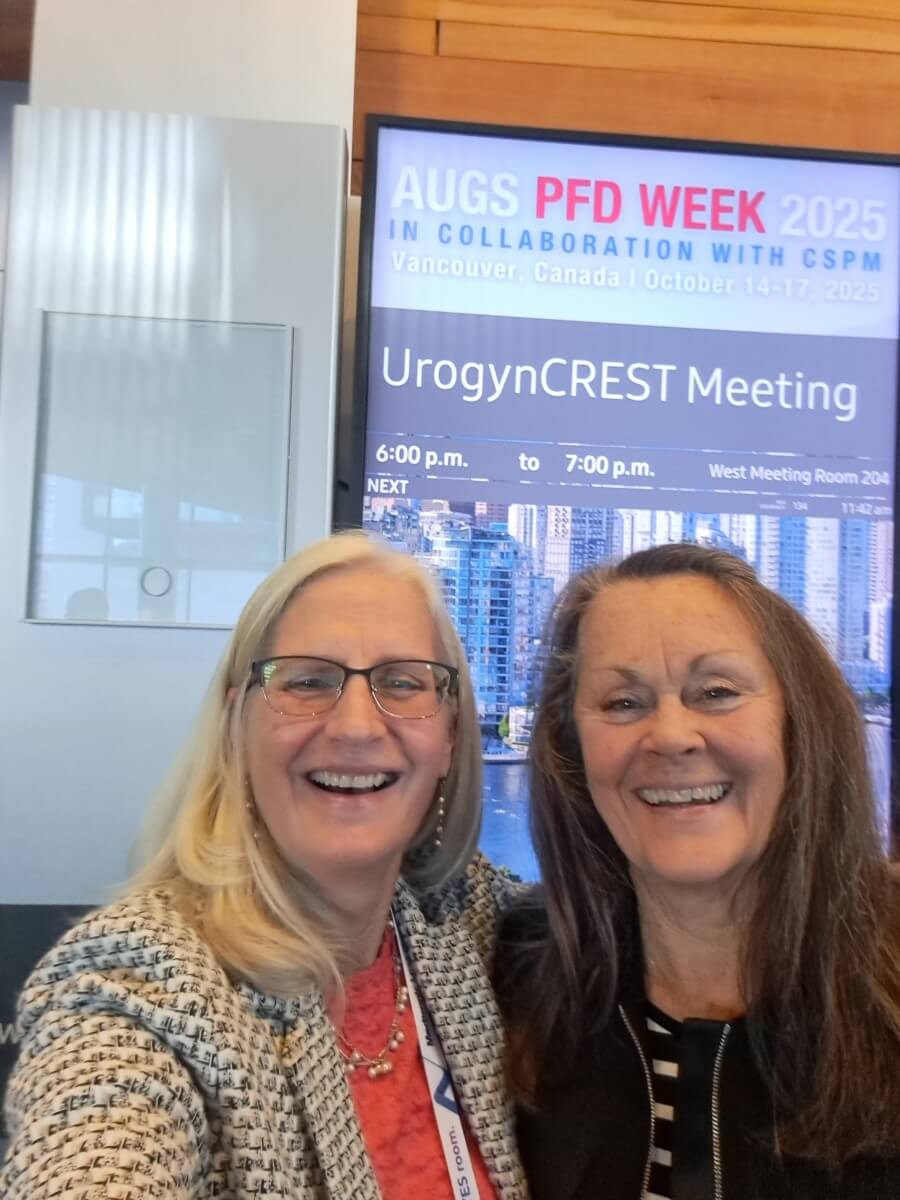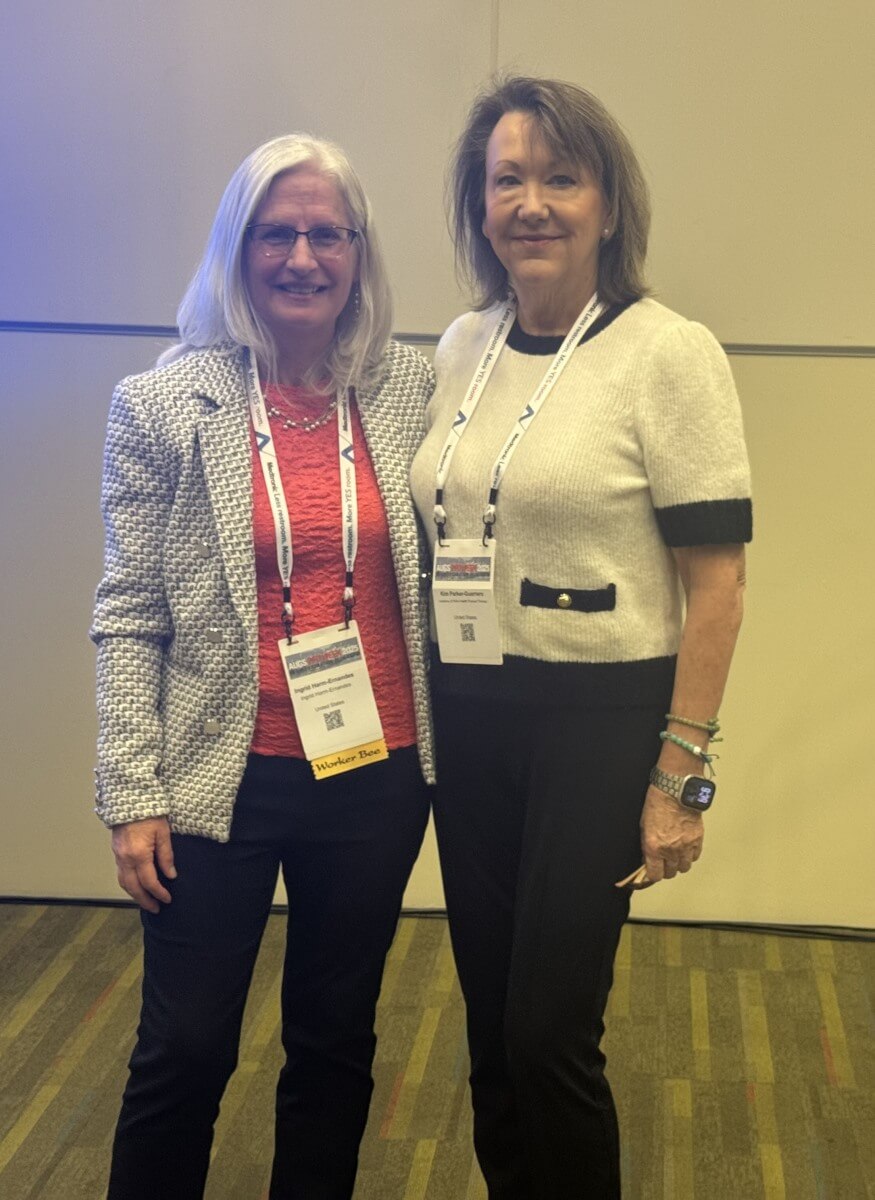Collaboration Between Specialties to Enhance Patient Outcomes
I would like to thank the Academy of Pelvic Health for supporting me and giving me the opportunity to act as an ambassador during the American Urogynecology Society Pelvic Floor Disorders Week (AUGS PFD Week). I had the distinct honor of presenting our workshop: “Beyond the Tip of the Iceberg: A Comprehensive Approach to Menopause Transitions”, with Dr. Naz Siddique, Dr. Anne Ford, and Dee Hartmann. We formed a team comprised of an OB/Gyn, a Urogynecologist, and two pelvic physical therapists. Our presentation topics included: how biomes significantly impact health, how utilizing hormones, medication, and over-the-counter products impact our patients, the importance of sexual health as a critical component of health during menopause, and the critical changes in the musculoskeletal system (MSK) during menopause can impact not just the pelvic floor but the entire body. Prior to our workshop, many of the participants had not considered the MSK system as such an important factor that can dramatically impact our patients’ lives during menopause. Our workshop helped them see the value of considering the MSK system and associated treatments, of understanding sexual health, navigating all the various hormonal and non-hormonal options, and the role of the biome. We encouraged interdisciplinary care, including physical therapy, to enhance patient outcomes when caring for their patients who are going through menopause.

Following our workshop, and in my role as an ambassador, I took the opportunity to speak with various members of the AUGS community. The overall agreement was that AUGS is a strong supporter of collaboration and interdisciplinary care. They work within their own society as well as with their international counterparts and will often share conference space with them. This year, the AUGS conference was held in Vancouver, and AUGS shared the conference with the Canadian Society for Pelvic Medicine (CSPM).
Dr. Holly Richter is a past president and has been involved with many facets of the AUGS organization. She feels that society has moved from an expert opinion society to one that is evidence-based, centered, learning from that data and finding what works best for patients. She notes that ideas and concepts coming from other specialty groups, like physical therapy, help form and shape research, which enhances how research projects are performed.
Dr. Richter notes that AUGS has always been inviting to other practitioners and encourages breaking down silos, so that practitioners can form teams to better treat their patients. AUGS members know that they “Can’t do it alone” and that teamwork is vital. She reports that it is also important to work with industry to ensure that innovation and quality devices allow for the best care possible for our patients.
Dr Lisa Hickman, Vice Chair of the Advanced Practice Provider (APP) Education Committee, notes that the society is small enough to be able to focus on all the practitioners involved in urogynecological care, which helps strengthen the interdisciplinary team, which in turn supports our primary mission - that is, to serve our patients. Even though the membership of AUGS is small compared to some societies, Dr. Cassandra Kisby (Social Media Committee) states that we are large enough to have missions within our greater missions. Patient care must always be primary, and to achieve this, the education of our members must be strong across all disciplines. In support of this statement, Dr. Alexis Dieter, an active member of AUGS, states that AUGS encourages PT involvement on all levels and seeks out input from PTs on workshops, conference activities, as well as research.

Dr. Hickman states that “AUGS is not just about physician education”. She adds that “AUGS celebrates and emphasizes their education mission across all of the interdisciplinary groups”. Besides PFD Week, AUGS started the AUGS APP conference a few years ago, and it has grown tremendously each year. I have had the distinct pleasure and honor of leading workshops that have, in the words of many of the AUGS APP attendees, “changed my practice patterns” and have stated that, “This workshop has given me a much better sense of how important the MSK system is, in pelvic floor disorders”. Dr. Cassandra Kiisby reports that offering this kind of education helps the membership come up with unique interdisciplinary care plans, improved collaboration with all team members, as well as collaboration on research. She states that in addition to educating AUGS members, it also develops patient education with Voices for PFD. This gives patients reliable and credible information regarding pelvic floor care.
“AUGS appreciates the MSK system, the pelvic physical therapists that treat MSK symptoms, and recognizes the important role physical therapists play in comprehensive pelvic care”, states Dr. Naz Siddiqui (who has held many roles in AUGS leadership). Personally, she notes that “MSK issues are a very large part of urogynecology/pelvic care and refers a large percentage of her patients to pelvic PT”. She states that “It is important to recognize that the main focus is achieving the best outcomes for your patients, regardless of whether or not they need surgery”. She believes that the MSK system is a primary component of pelvic care, and collaboration with pelvic PTs helps create the best outcomes.
Research for urogynecology is important, especially because they are a newer, growing field. Magaly Guerrero (Senior Clinical Research Coordinator) from Duke notes that collaboration is of vital importance if we are to have a full picture of what is best for our patients. “Incorporating physical therapists, fellows, nurses, and residents helps shape research in the urogynecology field and is how we can be successful.”
What is ahead for AUGS? AUGS is ever evolving, and its members see that AUGS is always working toward growth. Both Dr. Cassandra Kisby and Dr. Alexis Dieter see that AUGS often develops both patient and practitioner education. Both would like to see even greater development of these educational resources. They would like to see endorsements and collaboration with other organizations on standards of care and best practices. Having ambassadors from each organization will help promote these kinds of projects.

Being an ambassador gave me the opportunity to take time to discuss the philosophies of its members and leaders. AUGS is an organization that supports and honors a true collaborative approach within their society as well as with patient care. At the same time, they see the importance of continuing to develop other ways to collaborate, such as endorsements and guidelines. They welcome discussions with pelvic physical therapists and look forward to working on more projects in the future. Indeed, AUGS is an organization that honors and encourages cross-disciplinary collaboration and interdisciplinary care to enhance patient outcomes.
Author: Ingrid Harm-Ernande, PT
Board-Certified Clinical Specialist in Women's Health Physical Therapy
Recipient of the Academy's 2025 Cross-Disciplinary Ambassador Program Award
Presenter of the 2025 American Urogynecology Society Pelvic Floor Disorders Week (AUGS PFD Week)


